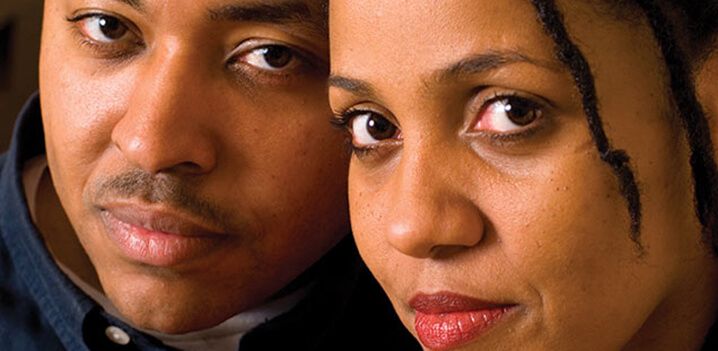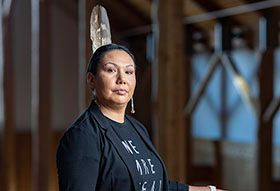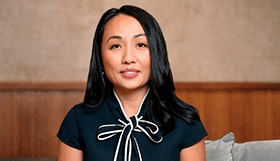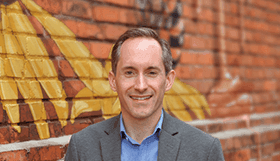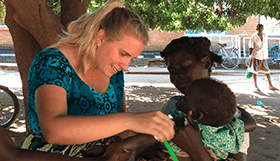2008 Forward under 40 Award Honoree
Founder and Chair of the Next Generation Education Foundation, President of KL Caire Companies, Co-Founder of the Next Generation Education Foundation and Founder/Editor of SisterSpeak Online Magazine
Though they came from very different backgrounds, the Caires are working together to create social justice by improving education.
Madison native Kaleem Caire didn't begin his collegiate career at the UW. After serving 3 years in the U.S. Navy, he enrolled at Hampton University, an historically black institution in Virginia. And though thats not where he completed his education, it was an important move, because Hampton is where he met Lisa Peyton, who would soon become his partner in education, in ambition, and in life.
When Lisa met Kaleem, she couldn't know that he would sweep her away from her southern home in Richmond, VA and convince her to transfer to a massive school in the frigid north. There are times, she admits, when I asked myself what on earth was I thinking? How did I wind up in a place so different, so distant so very far away from the familiar?
But in spite of Madison's colder temperatures, the Caires became fired with a drive to effect educational reform. Though Kaleems campaign for election to the Madison school board fell short, he spearheaded a number of youth initiatives, influenced the creation of the UW-Madison PEOPLE program, and advised the state and Madison school system on improving minority student achievement. While working for UW-Madison's Department of Information Technology (DoIT), Lisa co-founded the Information Technology Academy (ITA), a pre-college technology access and training program for first-generation college students. ITA has graduated four cohorts of students and is approaching its eighth year of service.
After leaving Madison for the Washington, D.C. area, the couple continued to push for creative ways to improve education, including founding the Next Generation Education Foundation, a Maryland-based nonprofit committed to increasing school success among adolescent males of color; leading the formation of the District of Columbia Association of Chartered Public Schools; establishing the nations first federally funded private school voucher program; leading an unprecedented campaign that has secured more than $200 milllion in K-12 education in Washington, DC; working to develop quality charter schools; and commissioning the nations first comprehensive study of high school graduation rates.The Caires reside in Bowie, Maryland and have five children three sons and two daughters.
In their own words
Lisa's Essay
I am exceedingly proud to be an alumna of the UW-Madison. I relish in the great respect my UW credentials garner wherever I go, and feel deeply fortunate to have had the opportunity to study, live, grow, and contribute my talents to an institution that exemplifies excellence, service, and endless possibility.
Never would I have imagined that I, a southern belle from Richmond, Virginia, would find herself in the Badger State, hundreds of miles away from the small, tight-knit community I had known all of my life. When I visited the campus in the summer of 1992 then a rising junior at the historically black college, Hampton University in Hampton, Virginia I had no idea that fate would find me at Madison one year later, married, expecting my first child, and officially a senior in the Sociology Department.
To say I experienced culture shock is an understatement. I struggled to find my place among the UW's 40,000-plus students and in its sprawling lecture halls of seemingly nameless peers and distant professors who projected their lectures from stages and elevated platforms. I wandered through the meandering bellies of gargantuan libraries often losing my way in dark, maze-like reading rooms following long hours of exhaustive research and study. I climbed the famed Bascom Hill in the thick heat of summer and through the bone-chilling cold of a Madison winter often with child in tow treading snow and ice; my nose and fingers frozen by a cold I had never imagined, experienced, or thought possible.
There were days I asked myself why?, how?, what on earth was I thinking?. How did I wind up in a place so different, so distant so very far away from the familiar; so very far way from home?
But the day would come that I would find my bearings, resolved to conquer the giant and complete the mission at hand.
And herein, perhaps, lies the impact of the great UW on my life. My husband and I came to the university with a simple plan to complete our degrees and leave. Though he was born and raised in Madison, my husband had no special interest in remaining in his hometown. We estimated that it would take two years for the both of us to complete undergrad, after which wed readily head back to the east coast. But leaving was oh so hard to do. Our two years became four years; four years became six; and six would ultimately stretch to eight years, the majority of which for me were spent either studying or working on campus. We took turns completing our studies, and I would even go on to complete a Masters Degree in Education and to begin doctoral studies. In the midst of it all, wed have two more little ones, raising our young family in Eagle Heights perhaps the most perfect place on the planet for kids while working, studying, managing our lives and making inroads in the ways we could to leave the community better than we found it. The university's commitment to service and its openness to taking chances that other institutions shy away from, made it possible for us to move, work and serve in ways that have had a real and lasting impact on the lives of others.
We became a part of the UW, and it became a part of us. Our lives unfolded in this strange yet promising place; a place where friendships were forged friendships that remain intact today and stretch beyond the borders of state and country, color and creed. A place where opportunities abound for those with passion, vision, and the will to make a difference.
Kaleem's Essay
It is difficult to summarize how impactful the UW was on my life and that of my family. I was born at the old Methodist Hospital in Madison and raised on Madison's south side by my aunt and extended family. My family was one of the earliest black families to relocate from the south to Madison in 1908. However, though I was raised in Madison and attended elementary school just three blocks from the university campus, I never really new much about the university until I took a tour with the multicultural student group during my sophomore year at West High School. I used ride my bike from south Madison with friends and visit Camp Randall Stadium with the hope of one day playing there, but I never really thought it was possible.
I enrolled in UW-Madison during the summer of 1993 after transferring from Hampton University in Hampton, Virginia. From 1993 until I completed by last class in 1998, the UW had a profound effect on my life and career.
When I matriculated to the university in 1993, I started in the honors and nutritional sciences programs in the School of Agricultural and Life Sciences and had then-Dean Maxwell as my mentor. It was the honors research class that I took with Dean Maxwell that summer that turned me on to research, and helped set the foundation for research I would later do on my own. It was also during my conversations with Dean Maxwell about my career interests that led me to transfer to the School of Education. I had explained to Dean Maxwell that I felt pulled between my interests in medicine and my interests in being more directly involved in efforts to help young people from under-resourced families and communities. Understanding my concerns and wanting the best for me, Dean Maxwell introduced me to Michael Olneck in the School of Education.
During my second summer on campus, Professor Olneck took me to lunch and we talked about my interests. I told him that I was really interested in figuring out how to have an impact on young people who grew up in adverse circumstances similar to my upbringing. I had great mentors growing up and wanted to position myself to have an equally positive impact on other young people. Professor Olneck encouraged me to enroll in his summer class on Race, Class, and Ethnicity in Education. That class completely changed the direction of my career. Learning about how education had been used to disenfranchise and enfranchise black, Latino, and Native American people sewed within me an undying quest for social justice.
I spent the next two years attending special lectures and reading and researching everything I could on the education of Blacks, Latinos/Chicanos, and Native Americans that I could get my hands on. I spent countless hours at the Memorial and College Libraries, the School of Education LMC Library, and the State Historical Society. I also enrolled in the Broad Field Science program in the School of Education. However, after completing my first semester of classes in Broad Field Sciences, I felt I was not learning enough about the political and social dynamics affecting urban education. Feeling I could not get what I needed at UW-Madison, I began talking with my school of education counselor about transferring to UW-Milwaukee to take advantage of their Urban Education Program. It was Associate Dean John Kean who stopped me from transferring, and instead he and a counselor there (cant remember her name) encouraged me to consider completing an Individualized Major in Education (IME) so that I could focus on my interests and maintain a part of the UW-Madison campus. They also expressed a sincere interest in my abilities. I decided to stay, enlisted the support of four great professors to help guide my study in urban education (Gloria Ladson-Billings, Michael Fultz, William Bill Tate, Michael Olneck, and Michael Apple).
In the years that followed, with the help of the professors named above and a host of others (Ken Mayer, Poli Sci; Hardin Coleman, Marianne Bloch, Stacey Lee, B. Bradford Brown, Alice Udvari Solner, and Adam Gameron, Education; Nellie McKay and Herbert Hill, African Amer Studies; Professor Franklin, Sociology; and many others whose names I cannot remember) who I owe so much too. They encouraged me and stood by me during periods when I struggled to balance fatherhood, being a husband, working to earn a living, and completing school. They also supported me when I ran unsuccessfully for seat on the Madison Metropolitan School District Board of Education in 1998. BTW, it was Michael Olneck who recommended me for my job with the Wisconsin Department of Public Instruction that moved me to another level professionally.
I also established great, lasting relationships with my peers and staff/leadership on campus. LaMarr Billups, Paul Barrows, Hazel Symonnette, Tess Arenas, Carlotta Calmese, Candace McDowell, Cleveland James, Walter Lane, the former Dean of the School of Letters & Science, and the secretaries in the School of Educations Curriculum & Instruction and Education Policy Studies departments were huge supporters and coaches of mine. They gave me opportunities to expand my leadership abilities through participation on UW Committees and in important meetings, promoted me to others, and were always open and available to give me advice about being a dad, a husband, and a student. Without all of these people, I know I would not have gotten as far as I have. They were great ambassadors for the university.
The friendships I established were equally as rewarding and enriching. Students on campus were huge champions of mine and contributors to my development. It was students in the School of Education who encouraged me to run for student government (Associated Students of Madison) and elected me in 1996. It was students of the Civil Rights Defense Coalition who supported my push to establish pre college programs as a vehicle to increase the preparation of students of color for admission to UW-Madison, and graduate students such as Peter Young, Eric Grotsky, Matt Candler, and Matthew (last name?) who inspired me to run for the school board and supported my candidacy. And it was professor Marianne Bloch and the faculty and administration of the UW-Madison School of Education who supported the efforts of a friend of mine and I to start the SHAPE tutorial program in the School of Education. Then there was Eagle Heights, where my wife, children and I resided for three years and established some great relationships with friends from around the world. We still maintain strong friendships with our Eagle Heights family.
Every idea I had, there was always someone at the university who was willing to listen and assist. The camaraderie I experienced at UW-Madison has been unmatched since. It is because of all of these great people and great experiences that I have been hooked on education and community development ever since.
I will forever be indebted to UW-Madison for giving me the foundation to succeed in my career, for strengthening my commitment to learning, for being so supportive to my wife Lisa and me, and our children, and for helping my dream of receiving a college degree from my favorite university a reality.
I will remain a strong supporter of UW-Madison until I die and hopefully if I strike it rich, Ill remain a supporter after I pass on as well.:-) If you ever need an ambassador or recruiter for the UW, give me a call. Thank God for Direct TV, because I can at least catch all of the Badger basketball, football, and hockey games on TV!
